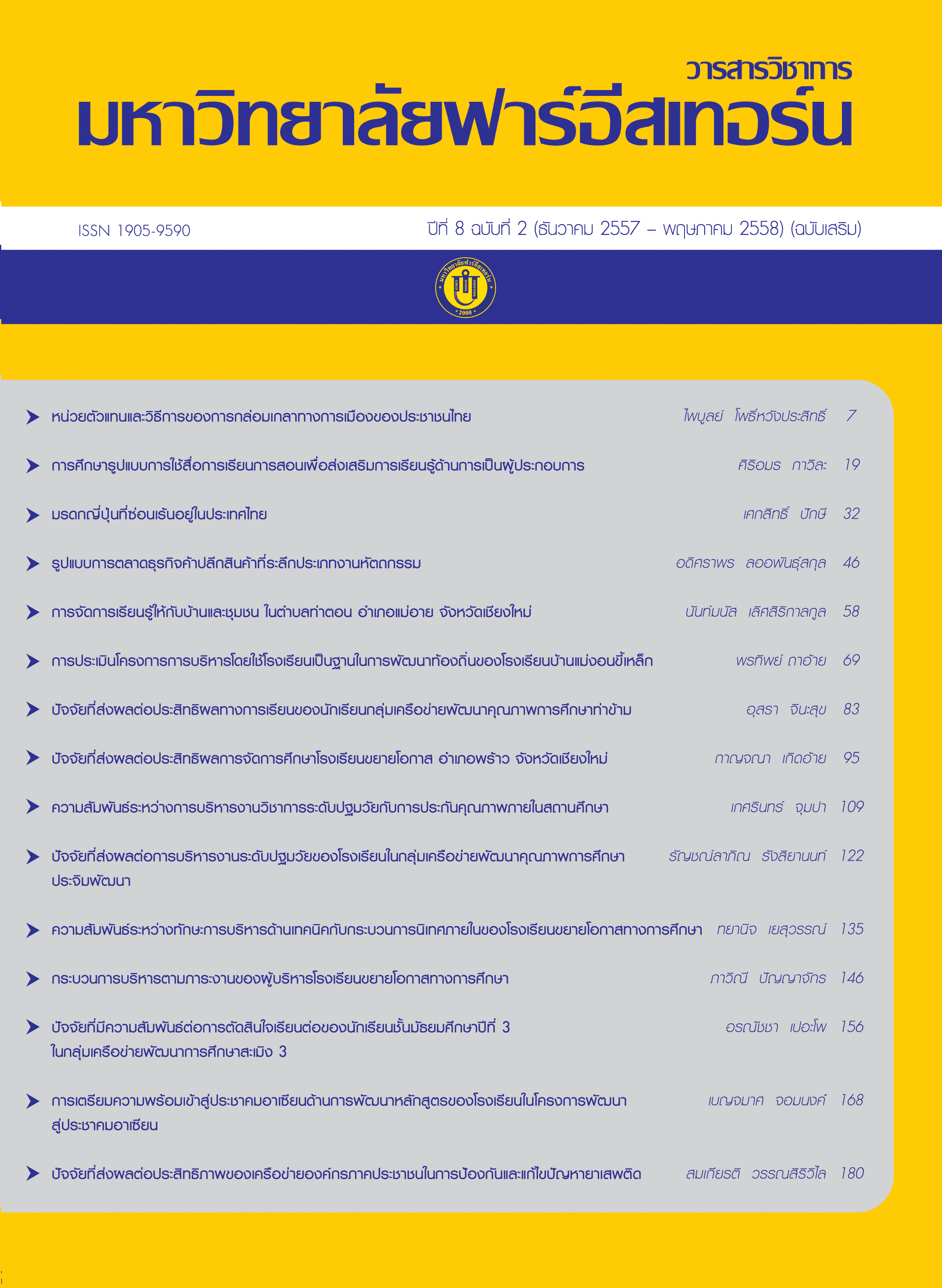การจัดการเรียนรู้ให้กับบ้านและชุมชน ในตำบลท่าตอน อำเภอแม่อาย จังหวัดเชียงใหม่
Main Article Content
Abstract
งานวิจัยนี้มีวัตถุประสงค์ เพื่อศึกษาและจัดการเรียนรู้ให้กับบ้านและชุมชน ในตำบลท่าตอน อำเภอแม่อาย จังหวัดเชียงใหม่ และเพื่อติดตามผลการจัดการเรียนรู้ให้กับบ้านและชุมชน ในตำบลท่าตอนอำเภอแม่อาย จังหวัดเชียงใหม่ กลุ่มเป้าหมายที่ใช้ในการวิจัยครั้งนี้ คือบ้านและชุมชน ในตำบลท่าตอน อำเภอแม่อาย จังหวัดเชียงใหม่ รวมทั้งสิ้น 25 คน เครื่องมือที่ใช้ในการวิจัย คือ (1) แบบสำรวจ (2) การจัดการเรียนรู้ ได้แก่ แผนการเรียนรู้ภาษาไทยเบื้องต้น เอกสารประกอบการสอน และแบบประเมินการจัดการเรียนรู้ และ (3) แบบสัมภาษณ์ วิเคราะห์ข้อมูลโดยการวิเคราะห์แบบอุปนัย ผลการวิจัยพบว่าบ้านและชุมชนในตำบลท่าตอน อำเภอแม่อาย จังหวัดเชียงใหม่ มีความต้องการให้บุคคล หรือหน่วยงานที่เกี่ยวกับการจัดการศึกษาเข้ามาสอนหนังสือในวิชาภาษาไทย ผู้วิจัยจึงเข้าไปจัดการเรียนรู้ให้กับบ้านและชุมชนในตำบลท่าตอน ตามแผนการเรียนรู้ในหลักสูตรการศึกษานอกระบบ ระดับการศึกษาขั้นพื้นฐาน พ.ศ. 2551โดยได้จัดทำแผนการเรียนรู้ภาษาไทยเบื้องต้น และเอกสารประกอบการสอน ซึ่งผู้วิจัยได้ดำเนินการจัดการเรียนรู้ให้กับบ้านและชุมชนในตำบลท่าตอน จำนวน 150 ชั่วโมง เป็นเวลา 50 สัปดาห์ ตั้งแต่วันที่ 31 มกราคม 2556 ถึง 23 มกราคม 2557 และผู้วิจัยได้ทำการติดตามผลการจัดการเรียนใน กลุ่ม 5 สาระ ของกลุ่มเป้าหมายเมื่อวันที่ 16 กันยายน 2557 ด้วยวิธีการสัมภาษณ์ผู้สำเร็จการศึกษา (1) การอ่าน พบว่าสามารถอ่าน คำ ข้อความ ประโยคต่าง ๆ ที่พบเห็น และอ่านหนังสือนอกเวลา หนังสือธรรมะ โดยเข้าใจความหมายจากเรื่องที่อ่าน สามารถอธิบายเรื่องราวที่อ่านได้ ทั้งยังเกิดความมั่นใจในการติดต่อประสานงานกับบุคคล หน่วยงานราชการ โดยเฉพาะการติดต่อกับที่ว่าการอำเภอแม่อายเพราะสามารถอ่านข้อความบนเอกสารขออนุญาตออกนอกพื้นที่ได้ และการติดต่อประสานงานกับโรงเรียน โดยสามารถอ่านใบรายงานผลการเรียนของนักเรียนและอ่านเอกสารโครงการหรือกิจกรรมต่าง ๆ ของทางโรงเรียนได้ และเข้ามามีส่วนร่วมกับทางโรงเรียนมากขึ้น (2) การเขียน พบว่าสามารถเขียนชื่อ นามสกุล ตัวเองได้ แทนการพิมพ์ลายนิ้วมือ ในการลงลายมือชื่อบนเอกสารต่าง ๆ สามารถเขียนสื่อสารแสดงความคิดเห็นเกี่ยวกับตัวนักเรียน และเขียนประเมินโครงการหรือกิจกรรมต่าง ๆ ของโรงเรียนได้ สามารถเขียนกระทู้ธรรม รวมทั้งเข้าใจความหมายและอธิบายเรื่องที่เขียนได้ เกิดความมั่นใจ มีความกล้าในการติดต่อประสานงานกับบุคคล และหน่วยงานราชการ (3) การฟัง การดู และการพูด พบว่าสามารถฟัง ดู และพูดสื่อสารภาษาไทยกลางกับบุคคล และหน่วยงานต่าง ๆ ได้โดยเข้าใจเรื่องที่ได้รับฟัง สามารถพูดโต้ตอบ ถ่ายทอดความรู้สึกนึกคิดของตนให้เป็นคำพูดได้ ซึ่งมีประโยชน์ต่อการประกอบอาชีพได้แก่ อาชีพค้าขาย อาชีพรับจ้างทั่วไป อาชีพก่อสร้าง และอาชีพทำไร่ทำนา ทำให้มีรายได้เพิ่มมากขึ้น เพราะสามารถเพิ่มประสิทธิภาพการทำงาน เกิดความกล้าที่จะพูดกับครูและผู้บริหารสถานศึกษาเพื่อส่งเสริมและพัฒนานักเรียนร่วมกับโรงเรียน (4) หลักการใช้ภาษาไทย พบว่าสามารถเข้าใจหลักการใช้ภาษาไทย และมีการทบทวนฝึกฝน เพื่อนำไปต่อยอดในระบบการศึกษานอกโรงเรียน และศึกษานักธรรม ต่อไปในอนาคตได้หากมีคำไหนที่ อ่านสะกด เขียนคำไม่ได้ก็อาศัยบุตรหลานของตนช่วยแนะนำและสอนเพิ่มเติม ทำให้ความสัมพันธ์ระหว่างครอบครัวมากขึ้น และ (5) วรรณคดี และวรรณกรรม สามารถอ่านบทร้อยแก้ว บทร้อยกรอง และท่องจำบทอาขยาน บทร้องเล่นพื้นบ้าน และสามารถนำไปประยุกต์ใช้ในชีวิตประจำวัน เช่นการร้องเป็นเพลงกล่อมเด็ก และส่งเสริม การละเล่น ของเด็กไทย เป็นต้น ตลอดจนสามารถช่วยฝึกสอนการท่องบทอาขยาน และบทร้องเล่นพื้นบ้านให้กับนักเรียนในระดับชั้นประถมศึกษาปีที่ 1 ได้
This research aimed to investigate and arrange learning for houses and community in Tha-ton Sub-district, Mae Ai District, Chiang Mai Province and to follow-up the results of learning management for houses and community in Tha-ton Sub-district, Mae Ai District, Chiang Mai Province. The total number was 25. The tools used in this research included (1) survey form (2) basic Thai learning plan, supplementary sheets and evaluation form (3) interview form. The data were analyzed through Inductive analysis. The findings were as follows: learning arrangement for the target groups in Tha-ton Sub-district, Mae Ai District, Chiang Mai Province derived from the demands of themselves requiring individuals or agencies related to educational management by teaching them Thai. Thus, the researcher arranged learning for the target groups based on the learning plan of non-formal education at the levelof basic education of year 2008 by preparing basic Thai learning plan and supplementary sheets. The researcher arranged learning for houses and community in Tha-ton Sub-district for 150 hours. It took 50 weeks from January 31, 2013 - January 23, 2014 and the researcher followed-up the results of learning arrangement in the groups comprising 5 contents of the target groups on September 16, 2014 by interviewing the graduates.
(1) Reding showed that they could read words, messages, sentencesas seen and external reading books, Dhamma books by understanding the meaning of the story they read, explaining the story they read. They felt confidence to contact with people, government agencies, especially Mae Ai District Office since they could read the messages in the documents requesting to leave the area and could coordinate with the school by being able to read student’ s grade reports, documentation, projects or various activities of the school. Those made the target groups have much more involvement in the school. (2) Writing revealed that they could write their own names and family names instead of fingerprinting in order to sign their names in various documents, write in order to communicate and express their opinions about themselves, write in order to evaluate projects or various school activities, write Dhamma questions and also understand the meanings and explain about what they wrote. They had self-confidence and dared to contact and co-ordinate with people and government agencies. (3) Listening, viewing and speaking indicated that they could listen, view and speak Thai with people and various agencies, understand what they listened to, communicate and transfer their feelings into words which was useful to their occupation including trading, general employment, construction and agriculture. That helped increase their income since they could enhance their performance efficiency. They dared to speak with teachers as well as school administrators in order to promote and develop the students with the school.
(4) The principle of using Thai language showed that they understood the principle of using Thai language by revising and practicing in order that they could further their studies at non-formal education schools and Dhamma schools in the future. If there were any words they could not read, spell and write, their own children would help them with some advices and teaching. That helped them increase the relationship among their own families. (5) Literature and literary writings revealed that they appreciated the beauty of Thai language by being able to read proses, poetries and memorize recitations and folk lyrics and could apply them in their daily lives, such as to sing lullabies and to promote games for Thai children and so on. Moreover, they could assist to teach Prathom 1 pupils to memorize recitation and folk lyrics.
Article Details
1. Any views and comments in the Journal of Social Innovation and Lifelong Learning are the authors’ views. The editorial staff have not to agree with those views and it is not considered as the editorial’s responsibility.
2. The responsibility of content and draft check of each article belongs to each author. In case, there is any lawsuit about copyright infringement. It is considered as the authors’ sole responsibility.
3. The article copyright belonging to the authors and The Far Eastern University are copyrighted legally. Republication must be received direct permission from the authors and The Far Eastern University in written form.

